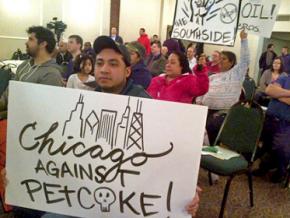Koch needs to clean up
, a member of the System Change not Climate Change coalition in Chicago, report on a local struggle against multinational polluters.
THE MESSAGE was clear last week at a forum in Southeast Chicago: We don't want petcoke in our backyard!
Petcoke, or petroleum coke, is a toxic coal-like powder and a by-product of the refining of tar sands oil, regarded as one of the dirtiest fossil fuels in the world. Over 100 community members and environmental activists came out to a town hall hearing held in the Chicago neighborhood of South Deering about the dumping of petcoke near the Calumet River. As VICE News reported, the petcoke is stored near the river before it's processed at the British Petroleum (BP) refinery, located in Whiting, Ind.
Residents of Southeast Chicago residents are all too familiar with having to deal with industrial pollution. As Southside local Olga Bautista wrote for SocialistWorker.org in January:
The pollution in our neighborhood was something that we didn't think much about when we were growing up. We got accustomed to the smell from the nearby landfill that often wafted into the neighborhood on hot summer days. When we went swimming at Calumet Park Beach, there would always be a black residue on the shore as the tide was receding, and many times we saw little black pieces of coal that likely fell from the barges and freighters into Lake Michigan.

Last week's forum was largely organized by a handful of organizations based in Southeast Chicago, including the Southeast Side Coalition to Ban Petcoke and the Southeast Environmental Taskforce. It was just the latest held in the area since last year, when the piling of petcoke reached new highs. One of the past meetings brought out as many as 300 people.
One of the key points on the meeting's agenda regarded a series of ordinances put into place by the city as a way of mediating petcoke pollution. They included restricting the amount of petcoke that would be allowed to be stored in the city, and covering the piles already present in the community.
The ordinances themselves were the result of the negative media attention about the health risks associated with massive piles of petcoke. That coverage, while scarce, was largely the result of folks organizing around this issue.
However, as Bautista made clear at the meeting, just covering up the petcoke piles would be like putting a Band-Aid on the problem. The Southeast Side Coalition to Ban Petcoke is calling for complete removal of the petcoke, and residents at the meeting clearly agreed.
Neighborhood resident Carol Granados stated that due to the dust emitted from the petcoke piles, she hadn't been able to see through her windows in months. She also informed everyone that when petcoke is enclosed in large quantities, it is dangerously combustible. "I don't want my house being blown up or my neighbors or anyone in the community," she said, supporting the call to completely remove the petcoke.
Another resident, the widow of a retired steel worker, spoke about the need to reach out to workers who have to deal with the petcoke on an everyday level, as they have traditionally been overlooked in issues regarding pollution.
ONE OF the barriers to getting the petcoke removed is the lie being spread that the substance isn't harmful to people.
According to a letter from KCBX--a subsidiary of Koch Industries and the company responsible for the petcoke piles--sent to residents living near the piles, petroleum coke "is not a waste material as some have said, but a valued product intentionally produced as part of the process of refining crude oil...Similar to other industrial and agricultural bulk materials not affected by the elements, such as rain and excessive heat or cold, petroleum coke is typically stored in the open...
"It is also important to know that petroleum coke is not considered hazardous. The U.S. Environmental Protection Agency has stated that 'petroleum coke has an extremely low environmental hazard potential...[and] low health hazard potential.'" The letter also cited City of Chicago officials claiming, "[T]here are no known illnesses or health effects associated with petcoke dust."
Many residents aren't buying it, as shown by the turnout at the forum. But the fact that the EPA and the City of Chicago have both claimed that petcoke is not toxic gives a huge advantage to the Koch brothers and BP.
While there have been no long-term studies on the effects of petcoke, residents living near the piles know that the substance is harmful, since people have been getting sick ever since the petcoke arrived. Shouldn't that be evidence enough for action?
Not for Koch Industries. Instead, they use the lack of science against residents. The companies are interested in the immense profit petcoke will bring. According to Tim Dickinson writing in Rolling Stone, a U.S. State Department analysis found that U.S.-produced petcoke is "less expensive, including the shipping, than China's coal." China is now the top consumer of this U.S. export.
Thus, Koch Industries will stop at nothing to keep petcoke in Southeast Chicago--because there's a lot of money to be made.
The dumping of this toxic fossil fuel by-product on Chicago is part of a broader problem of systemic environmental racism, which must be confronted by a movement. Members of the System Change Not Climate Change ecosocialist coalition were invited to speak at the meeting in order to connect the petcoke struggle to a larger climate justice fight, and, ultimately to the need to confront capitalism.
Residents are planning a march and protest near the piles of petcoke, scheduled for April 26. The march will be joined by environmental activists as part of the Global Climate Convergence--10 days of action between Earth Day and May Day.


